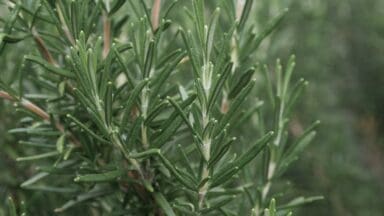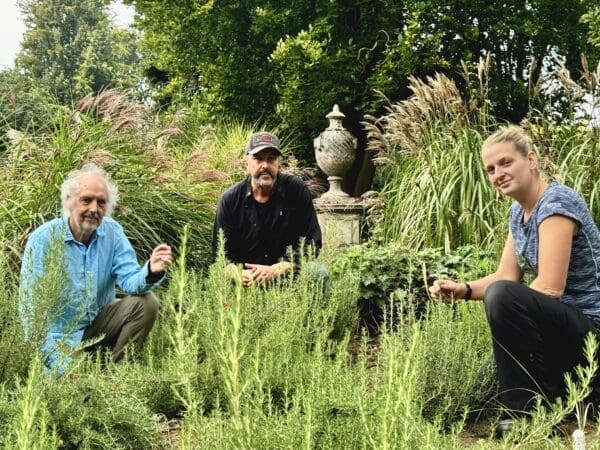
Following Simon Charlesworth’s retirement and the closure of Downderry Nursery, the extensive Salvia rosmarinus collection, which he had established with his wife Dawn, required a new home. Including over 100 varieties of rosemary, the collection includes prostrate, bushy and fastigiate, many of which tolerate -10 to -15 degrees celsius in temperature. The collection was granted National Plant Collection status in 1998.
William Dyson, salvia expert and curator at nearby Great Comp Garden agreed to take custodianship of the collection – which was moved there in November 2023. Settled into it’s new home, the plant conservation charity, have announced that they have (once again) granted this special collection, National Plant Collection® status ensuring its preservation for the future.
“We’re really delighted that Simon has entrusted his collection to us, which will be an educational resource in the garden. We’d like to foster a deeper appreciation for rosemary with our visitors. It’s a drought tolerant plant so with our changing climate and warmer, drier summers becoming more common, it’s a must have for the gardens of the future. Pale blue, white or pink flowers in mid-spring to summer make for an attractive sight in the border,
plus they’re also popular with pollinators,” said Dyson.
Dyson is a world expert on salvia with many years of passion for, and experience of, the genus. He has cultivated over 200 hybrids and species in the nursery at Great Comp Gardens, and has assisted with salvia trials at RHS Wisley. He intends for the collection to be used to educate visitors about rosemary and for them to leave with a greater appreciation for the plants, which are a valuable addition to the garden. Especially as once established, rosemary is drought-tolerant, an ideal choice for gardens in our ever increasingly hot and dry summers.
As a potential host for the Xylella fastidiosa bacteria, Rosemary is banned from import unless under a strict licence. The RHS only allows UK grown rosemary at its shows, which means that collections such as this can provide a crucial, stable source of bacteria free plant material.


Dyson added “The collection is a wonderful addition to our existing salvias, and it has settled in well this summer with all plants putting on a decent amount of growth. We have irrigated on an ‘as and when necessary’ basis because most of the plants are situated in very dry soil, in full sun.”
Gwen Hines, CEO of Plant Heritage, said: “It’s fantastic to have people who care about plant conservation coming forwards to start new National Plant Collections. Over four decades, we have demonstrated that this flagship conservation scheme is an effective way to protect special plants. It’s especially encouraging to have a longstanding collection like this successfully transitioned to a new home.”
Plant Heritage has also recently accredited a further 18 new National Plant Collections, these include a collection of Camellia including Camellia sinensis which thrives at Tregothnan Estate in Cornwall; an orchard of Gloucestershire apple cultivars at Longney Orchard; and a collection of 600 bearded Iris varieties that has been built over 60 years in Suffolk.
Held either in homes, gardens, greenhouse or on allotments by passionate individuals, or at nurseries, garden centres, arboretums or botanical gardens, the National Plant Collections (of which there are over 730) contain 95,000+ plants. Encouraging people to grow a wide variety of plants is good for biodiversity, and the plants in the National Collections can help to find varieties that are resilient to the challenges of climate change.

